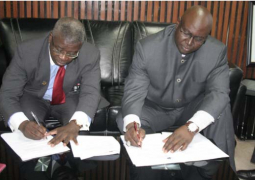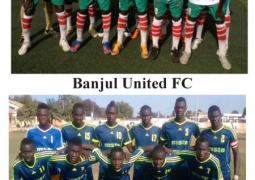
Ousman
Sonko, lead trainer, has said the business plan development training is hands-on,
because they need people who could definitely deliver the goods.
“The
process is participants-led and not trainers-led, so at the end of the day you
can also help others. We are tired of producing graduates who cannot do
anything; we want to produce people who can do the work,” he said during the
opening of a 10-day training of youths and women on business plan development.
The
training activity funded by the Gambia Commercial Agricultural Value Chain
Management (GCAV) attracted 80 young people and women, who were divided into
two batches, from November 20-29, 2016.
The
training course was aimed at empowering them with the skills to develop
bankable business plans.
It
was also meant to scale up youth involvement and participation in the
agricultural value chain through the relevant projects under the ministry of
Agriculture, in line with the inter-ministerial partnership between the
ministries of Youth and Sports and Agriculture.
The
project came about, after the two institutions realized that the young
entrepreneurs lack the capacity to produce standard or bankable business
proposals to attract funding for their various businesses, from donors and
projects.
He
said with this type of training course a lot of success has been registered.
He added that the training course was meant to
expose the participants on practical skills of business plan development and
that the benefits are multi-faceted.
He
said the idea is to help participants develop a winning business plan, because
at the end of the day NEDI has a responsibility to collect all these plans, and
on their behalf to appeal to different donors to sponsor and support the plans.
He
challenged the participants to socialize and network among themselves, and take
advice from each other and serve as role models to each other.
“I
challenged all of you to enjoy the process. If you enjoy the process, you are
not frustrated and you will be on top of every bit of it.
“As
young people, we don’t have time of blaming our parents, we don’t have time of
blaming authorities; our survival is our individual responsibility, others can
only be concerned, let us make best use of these opportunities,” he stressed.
Salifu
Puye, governor, Lower River Region, said the mission statement of NEDI is very
important for the employment and employability of youths and women of the
country.
He
said education provides or helps people to understand and contribute to the
development of the country.
“Book
education will not help us. Examination comes, you vomit it on the paper, you
come out with flying colours, but you cannot do anything. What we need is to
learn, and be able to do it; that is what learning is all about.”
The
government of The Gambia is going by the mission statement of NEDI by
empowering the youths and women of this country, to contribute their part to
the development of the country.
“Without
empowerment, there will be no work for the youths and women. This is what
triggered the back-way concept. The money they are going to look for is here in
the country; other foreign nationals are doing it here. You as entrepreneurs
need to be persistent, and build partnerships,” he continued.
He
further noted: “Private sector-led development always helps a country to grow,
in terms of the economy, and all hands must be on desk to build our country.”
He
challenged the participants to come up with realistic business plans, and focus
on the realities on the ground; this will enable you to have a viable business
that suit the standard of people in your area.
Mustapha
Badjie, programme manager NEDI, said the training course was part of the
mandate of NEDI to support and empower youths and women with entrepreneurial
skills.
He
said part of the criteria of most of the agricultural projects that provide
funding to youths and women business requires business plans.
“You
cannot access these funding unless you provided a tangible business plan.
“This is why we came up with this training to
support young people and women to be able to develop tangible and bankable
business plans, to access the funding provided by the agricultural projects.”
Mr
Alassan Minteh, principal, Rural Development Institute (RDI) challenged the
participants to take the training course seriously, saying a lot of resources
have been invested into the training activity, and failure to take it seriously
may led to a waste of resources.
He
said thousands of young people are in need of this type of training, but they
did not have the opportunity to be part of it.



